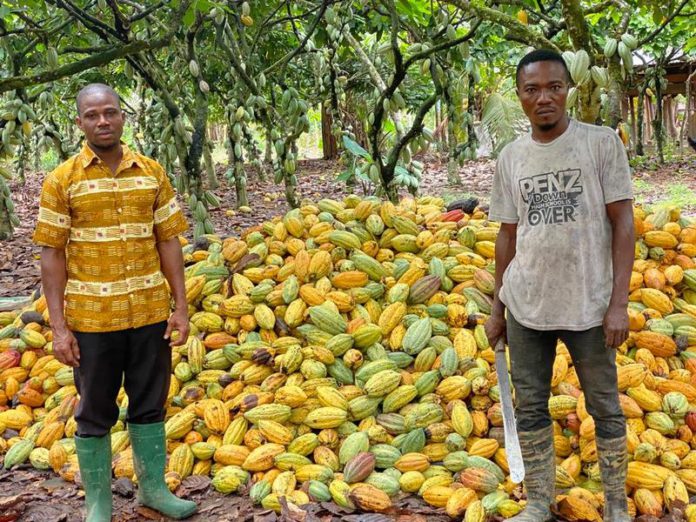The Ghana Cocoa Board is up in arms with MIGOP, a private mining company for allegedly destroying hundreds of hectares of rehabilitated cocoa farms in the Atwima Nwabiagya Municipality under the pretext of prospecting for gold.
Contrary to Section 18 of the Minerals and Mining Act, Act 703, of 2006, which enjoins mining companies to contact bodies that regulate the environment before undertaking any activity on the concession, MIGOP failed to contact COCOBOD before embarking on the prospecting.
Instead, MIGOP, a foreign-owned mining firm, allegedly went ahead with works on the concession and in the process, destroyed large tracts of cocoa farms which were recently rehabilitated by COCOBOD.
The company is allegedly using fear and intimidation to get the farmers to release their lands.
It has cordoned off some of the farms with white and red tape and used armed security personnel to patrol the place.
Violation of law
COCOBOD said the action of the company was in direct violation of the law as both MIGOP and the Minerals Commission failed to notify COCOBOD about the lease which was in a cocoa growing area.
According to section 18 of Act 703 (2006), “before undertaking an activity or operation under a mineral right, the holder of the mineral right shall obtain the necessary approvals and permits required from the Forestry Commission and the Environmental Protection Agency for the protection of natural resources, public health and the environment.”
Sub-section (2) of the action further states that “without limiting sub-section (1), a holder of a mineral right shall comply with the applicable regulations made under this Act and any other enactment for the protection of the environment in so far as relates to the exploitation of minerals.”
Following claims by the affected farmers over what they described as intimidation from the mining company, a team from COCOBOD visited the community to ascertain the assertion.
Speaking to the media during the field trip, the Head of the Anti-Illegal Mining Unit of COCOBOD, Prof. Michael Kwarteng, said the activities of the company were not only illegal but had dire consequences for the cocoa sector in the country.
He said most of the affected farms, which were about fruiting, were rehabilitated by COCOBOD with a loan facility from the African Development Bank.
Prof. Kwarteng added that besides that, the district produced about 9,500 metric tonnes of cocoa beans annually and that the activities of the mining firm would, therefore, affect the country’s cocoa production.
So far, five communities with more than 169 hectares of cocoa farms have been affected by the activities of the mining firm.
Some of the farmers also claimed that the company offered to pay them GH¢10,000 per acre and that when they refused, they threatened to forcibly take the land.
Currently, the company is prospecting for gold at Brahabebome, Nkotonmire and Ouagadougou, all in the Nkawie cocoa district.
Other communities targeted by the company are Apuoyem and Brosanko.
Denial
MIGOP has, however, denied engaging in mining activities in the affected communities, including the destruction of farms. Rather, it said it was engaged in exploration activities.
The Public Relations Officer of the company, Richard Gyasi, said “we are only doing exploration so we are not destroying crops. Those that got destroyed during the company’s activities, we are using the government rate to pay them”.
Cocoa production in the country has been on the decline since 2021, dropping from one million metric tonnes to 480,000 metric tonnes in 2024.
In April 2022, the Ghana Cocoa Board said over 19,000 hectares of cocoa farms had been destroyed as a result of illegal gold mining activities, a figure likely to increase by the close of this year.
ALSO READ:
George Andah’s emotional tribute to Mawuena Trebarh
Immigration Service reacts to ‘dismissal’ of officer over partisan politics

